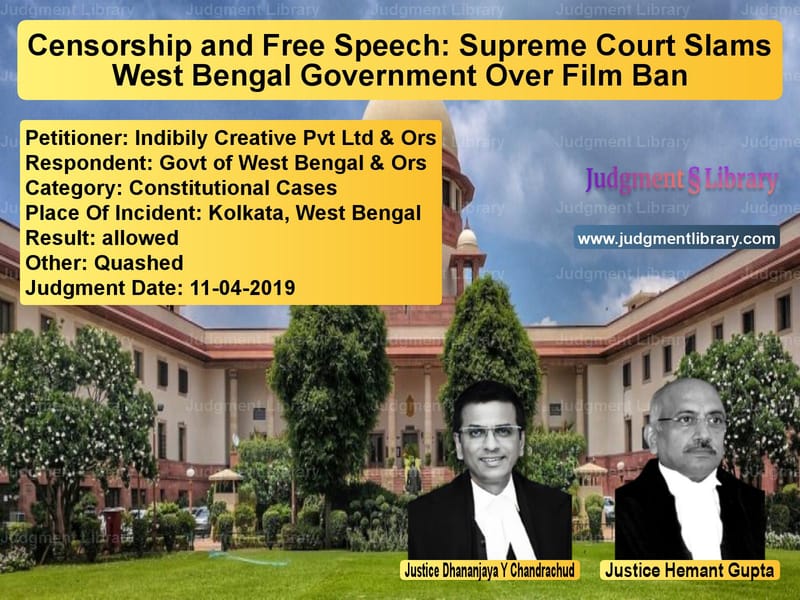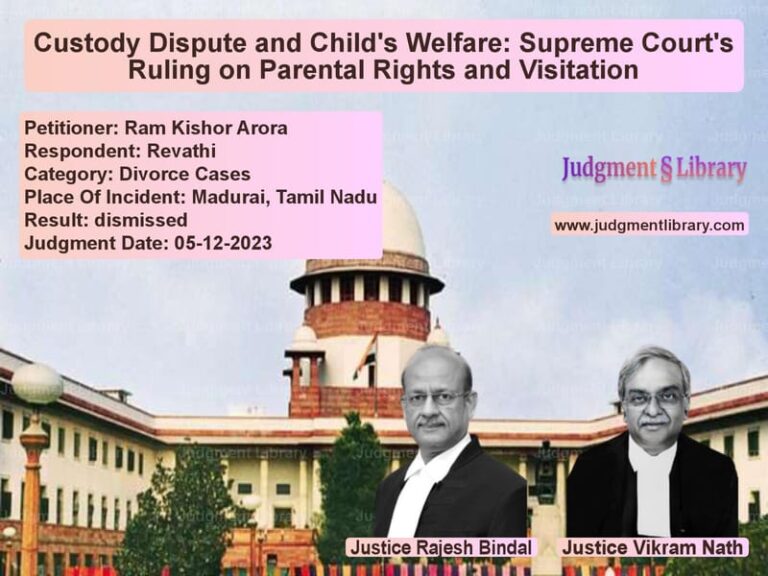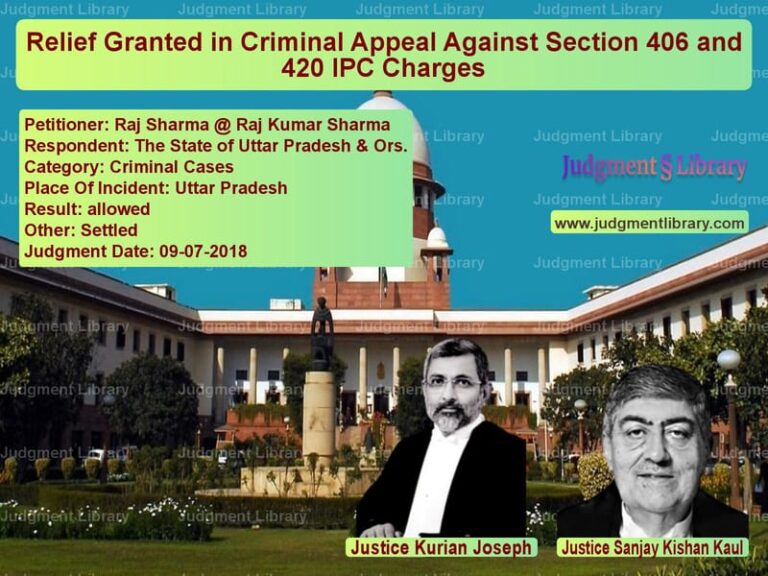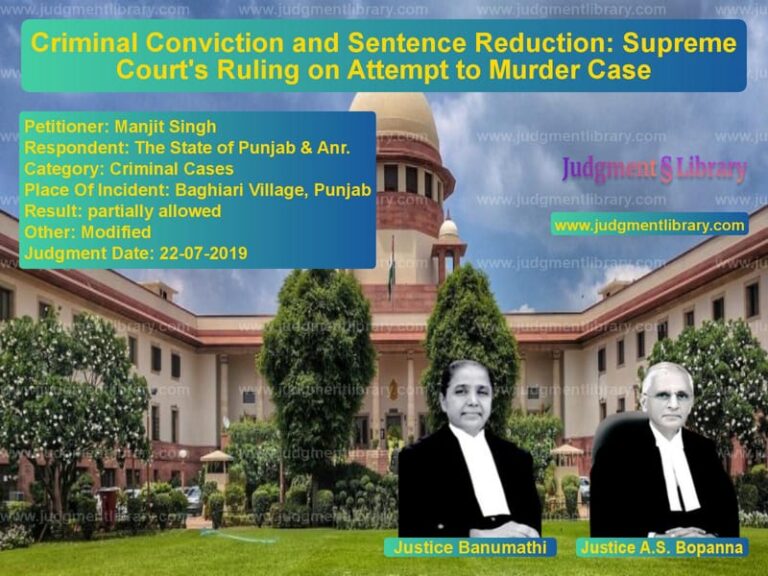Censorship and Free Speech: Supreme Court Slams West Bengal Government Over Film Ban
The Supreme Court of India has ruled in favor of the petitioners, Indibily Creative Pvt Ltd and others, against the Government of West Bengal and its authorities regarding the illegal obstruction of their Bengali film Bhobishyoter Bhoot. The Court held that the actions of the state government amounted to an unconstitutional suppression of free speech and expression. It further imposed a fine of ₹20 lakhs on the government for violating the petitioners’ fundamental rights under Articles 14, 19(1)(a), 19(1)(g), and 21 of the Constitution.
Background of the Case
The petitioners, a film production company and its directors, had produced Bhobishyoter Bhoot, a political and social satire about ghosts trying to make themselves relevant by helping marginalized people. The film was granted a ‘UA’ certification by the Central Board of Film Certification (CBFC) on November 19, 2018.
Scheduled for release in Kolkata on February 15, 2019, the film was being widely promoted. However, on February 11, 2019, four days before its release, the Kolkata Police contacted the producers, requesting a private screening for senior officials, citing concerns that the film’s content might “hurt public sentiments” and cause “political law and order issues.”
The producers refused, asserting that only the CBFC had jurisdiction to certify films and that no other authority could demand a pre-release screening. Despite this, within a day of its release, most cinema halls in Kolkata and nearby districts abruptly stopped screening the film, refunding tickets to customers without explanation. Multiple exhibitors cited pressure from unidentified “higher authorities.”
With the film effectively removed from theaters, the petitioners approached the Supreme Court, alleging unconstitutional censorship.
Legal Issues
- Whether the Government of West Bengal unlawfully suppressed the screening of a CBFC-certified film.
- Whether state authorities can interfere with film screenings on grounds of public order.
- Whether such actions violated fundamental rights under Articles 14, 19(1)(a), 19(1)(g), and 21.
Arguments Before the Supreme Court
Petitioners’ Arguments:
- The petitioners argued that once a film receives CBFC certification, no state authority can interfere with its exhibition.
- They contended that the West Bengal government was acting as a ‘super censor,’ overriding the CBFC’s jurisdiction.
- The petitioners cited previous Supreme Court judgments, including Prakash Jha Productions v. Union of India and Viacom 18 Media Pvt Ltd v. Union of India, where the Court upheld the autonomy of the CBFC.
- They highlighted the organized manner in which the film was removed from theaters, demonstrating collusion between the police and exhibitors.
Respondents’ Counterarguments:
- The state government denied imposing a formal ban on the film.
- It argued that concerns about public disorder justified law enforcement officers communicating with exhibitors.
- They contended that there was no explicit direction from the government to stop screenings.
Supreme Court’s Findings
The Supreme Court, in a detailed ruling, held that the actions of the state were unconstitutional and violated the fundamental rights of the petitioners. The key observations included:
- “Once a film has been duly certified by CBFC, it is not open to any authority either of the State Government or otherwise to issue formal or informal directions preventing the producer from having the film screened.”
- “The actions of the police were beyond their legitimate authority. The role of law enforcement is to protect free expression, not to become an instrument for suppressing it.”
- “The Constitution does not permit those in authority who disagree to crush the freedom of others to believe, think and express.”
- “The government’s claim of public order concerns is not a valid ground for suppressing free speech. If threats of violence exist, it is the responsibility of the police to provide security, not to silence expression.”
- The Court emphasized the importance of satire in democracy, stating: “Satire and irony are willing allies of the quest to entertain while at the same time leading to self-reflection.”
The Court further criticized the government’s attempt to justify its actions by citing law-and-order concerns:
“Freedom of expression which is legitimate and constitutionally protected cannot be held to ransom by an intolerant group of people. The State cannot plead its inability to handle the hostile audience problem.”
Final Judgment
The Supreme Court allowed the writ petition and issued the following directives:
- The Government of West Bengal was restrained from preventing the exhibition of Bhobishyoter Bhoot.
- The state must ensure that theaters screening the film are provided adequate security.
- The police must withdraw any informal instructions given to exhibitors to cease screening the film.
- The government was ordered to pay ₹20 lakhs as compensation to the petitioners for violating their fundamental rights.
- A cost of ₹1 lakh was imposed on the state government.
Conclusion
The judgment is a strong reaffirmation of the fundamental right to free speech and expression. It sets a precedent against state interference in film screenings under the pretext of maintaining law and order. The ruling underscores the importance of protecting artistic expression and upholding the autonomy of the CBFC in certifying films.
This case highlights the perils of extra-constitutional censorship and reinforces the principle that governments cannot act as ‘super censors’ by pressuring cinema halls to withdraw content arbitrarily. The ruling ensures that filmmakers can exercise their creative freedom without fear of unlawful suppression.
Petitioner Name: Indibily Creative Pvt Ltd & Ors.Respondent Name: Govt of West Bengal & Ors.Judgment By: Justice Dhananjaya Y Chandrachud, Justice Hemant Gupta.Place Of Incident: Kolkata, West Bengal.Judgment Date: 11-04-2019.
Don’t miss out on the full details! Download the complete judgment in PDF format below and gain valuable insights instantly!
Download Judgment: Indibily Creative Pv vs Govt of West Bengal Supreme Court of India Judgment Dated 11-04-2019.pdf
Direct Downlaod Judgment: Direct downlaod this Judgment
See all petitions in Fundamental Rights
See all petitions in Public Interest Litigation
See all petitions in Separation of Powers
See all petitions in Judgment by Dhananjaya Y Chandrachud
See all petitions in Judgment by Hemant Gupta
See all petitions in allowed
See all petitions in Quashed
See all petitions in supreme court of India judgments April 2019
See all petitions in 2019 judgments
See all posts in Constitutional Cases Category
See all allowed petitions in Constitutional Cases Category
See all Dismissed petitions in Constitutional Cases Category
See all partially allowed petitions in Constitutional Cases Category







